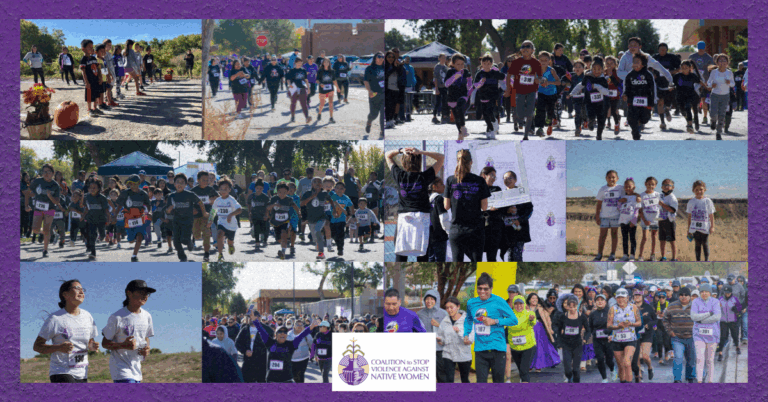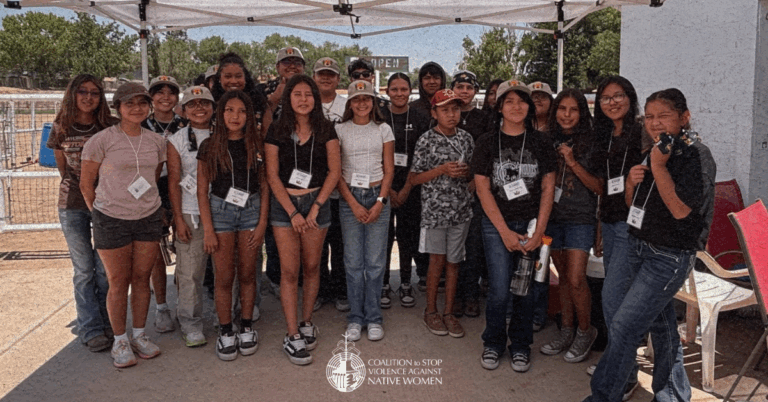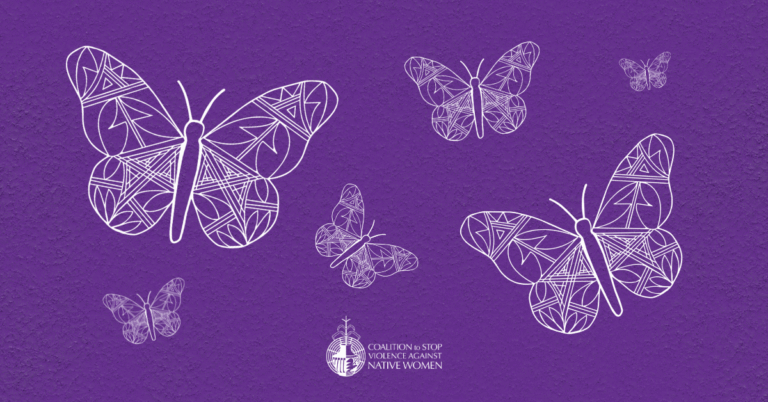Written by Tiffany Jiron, CSVANW Policy & Advocacy Director & Delaney Thiele, Gender-based Violence Project Coordinator
Domestic Violence is a silent issue and prevalent one causing so much pain and interruption in so many lives. The victim can be anyone, any gender, any ethnicity, a working or unemployed person. Victims live next door to you in big cities or small towns, upscale homes, mobile homes, and adobe homes.
According to the National Violence Against Women Survey (NVAW) conducted in November 1995-May 1996, both American Indian/Alaskan Native women and men report at higher rate of victimization by an intimate partner in their lifetime than White, African American, Asian Pacific islander, or other mixed-race women and men. You may read my Op-Ed from October 2020 to learn why the victimization rate is high: READ OP-ED.
More than 4 in 5 American Indian and Alaskan Native women will experience domestic violence in their lifetime. According to the domestic violence hotline, 1 in 7 men experience interpersonal violence in their lifetime. The National Intimate Partner and Sexual Violence Study (NISVS), 2010 Findings on Victimization by Sexual Orientation, found that study participants who identified as either lesbian or gay reported domestic violence and sexual violence rates which were equal to or higher than study participants who identified as heterosexual. Studies such as the National Transgender Discrimination Survey and the 2015 U.S. Transgender Survey have found that people who are transgender experience disproportionate rates of violence, particularly trans people of color. In New Mexico, service providers and law enforcement reported in 2018, 1 in 3 children in the state were present during domestic violence incidents. Native American children who see violence in the home are 75% more likely to become a future victim of violence or a perpetrator themselves.
The generational cycle of violence keeps repeating because our children are witnessing the violence, victims of abuse cannot reach lifesaving resources and laws are slow to change. We feel this heavily and deeply in Indian Country, where a non-Indian can still commit crimes against Indian women and men and do not face the consequences of the Tribal criminal justice system. Many of the crimes committed against Indian women and men then get their cases sent over to the federal justice system, where caseloads are overwhelmingly enormous. Native women from our Focus Group have reported that their case was severe, and it never made it to the federal court systems, and they never saw justice. Domestic violence is one of the causes for the MMIWR crisis in the state of New Mexico. Many of us know a best friend, a neighbor, mother, father, sister, brother, a daughter, and son that has been missing or murdered.
The annual financial costs of Intimate Partner Violence (IPV) are estimated at $5.8 billion annually, which includes emergency care visits, outpatient visits, hospital stays, physician visits, dental visits, ambulance services, and physical therapy visits. Medical and mental health services are estimated at $4.1 billion, and loss of productivity at $1.8 billion. IPV can include physical, sexual, psychological, and economic abuse as well as stalking.
The Coalition to Stop Violence Against Native Women (CSVANW) hosted a series of focus groups, titles “Reclaiming Our Stories” which gathered eight self-identifying Indigenous females, who live in New Mexico and are survivors of domestic violence. The purpose of the “Reclaiming Our Stories” project is to center the voices of those most impacted by gender-based violence. CSVANW values the tradition of our ancestors as storytellers and believes that gathering survivors to tell their stories, we can change narratives, public conversations, and shape policy around domestic violence. The stories and experiences that the survivors shared during the focus group will be utilized to support resilience, transcend survival, and support healing justice.
On July 21, 2023, participants of the focus group engaged in a one day 3-hour conversation around their personal domestic violence experiences led by a licensed trauma-informed provider.
The long-term goals of the “Reclaiming Our Stories” project is to inform CSVANW’s policy advocacy, support survivors in their ongoing healing while also developing policies that are reflective of survivors lived experiences and needs. “Reclaiming Our Stories” session participants gave consent for CSVANW staff to record quotes and information from the focus group under the condition that staff did not record identifiable information of the participations such as name, age, Tribe or Pueblo, etc.
We are holding the domestic violence stories in our hearts and honoring their confidentiality. These are their voices and the recommendations of the 8 Indigenous women who were a part of the Focus Group on Domestic Violence in July 2023. The graphic notetaking shares the powerful stories of Indigenous women who have given their time to help CSVANW learn what we need to do in order to support them and work towards ending the cycles of violence. When I see this graphic illustration of our focus group, I see ceremony taking place. I see and feel the healing, I smell the sage burning, and the tissue the tears.
Please honor the stories we share with you to bring awareness today, tomorrow, and every single day that violence is never okay. We are worthy of love, care, and safety. We can follow our dreams and be the things we dreamt of as little boys and girls. These are the testimonies of the experts of domestic violence. Thank you to the 8 Indigenous women who gave up their time to be with us and to share and trust us with your experiences. You are inspirational!
Please take care of yourself while reading the following testimonies from our focus group: READ TESTIMONIES
Related Posts

10 Years of Healing in Motion
The Story of CSVANW’s I Will Run for Them 5K Every October, during Domestic Violence…

CSVANW’s 13th Annual Native Youth Summit
The Coalition to Stop Violence Against Native Women held their 13th Annual Native Youth Summit (NYS)…

From Roots to Wings
From Roots to Wings. Why the Southwest Butterflies Retreat Matters More Than Ever CSVANW Voice…
